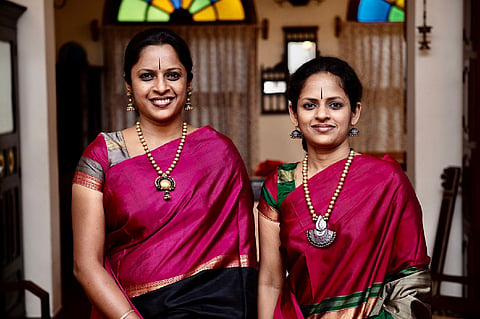
- LIFESTYLE
- FASHION
- FOOD
- ENTERTAINMENT
- EVENTS
- CULTURE
- VIDEOS
- WEB STORIES
- GALLERIES
- GADGETS
- CAR & BIKE
- SOCIETY
- TRAVEL
- NORTH EAST
- INDULGE CONNECT

In a city like Bengaluru, which is so culturally rich, it is not a surprise that a lot of effort is being taken to preserve Indian classical music. Nada Sambhrama, a music showcase, organised by The Nadathur Foundation aims to showcase the richness of Indian classical music, particularly carnatic music. This upcoming second edition of the festival features performances by the Akkarai Sisters (S Subhalakshmi and S Sornalatha) and Sandeep Narayan. We get chatty with the Akkarai Sisters regarding their upcoming performance, their experience performing as a duo, how they refine their craft over time and lots more…
What can the audience expect from the upcoming performance at the second edition of Nada Sambhrama?
S Subhalakshmi: Our concert usually features a variety of compositions from different composers and tempos. Since this event is happening in Karnataka, we might include pieces by various Karnataka composers. Nada Sambhrama aims to celebrate Indian classical music and we are excited to be part of it.
How do you see this festival contributing to the Karnataka music landscape?
S Sornalatha: It is very encouraging to see institutions coming forward to promote classical music. Preserving this art form is crucial and we appreciate Nada Sambhrama’s efforts in this direction. We are happy to contribute to this celebration of carnatic music.
How do you curate a set list for such events? Do you follow a theme or make spontaneous decisions?
Subhalakshmi: There is no specific theme for this concert; it will be a traditional carnatic music performance. We include compositions from different composers, ensuring a balance between structured pieces and spontaneous improvisation. Carnatic music thrives on spontaneity, which keeps the performance dynamic and engaging.
Could you share your experience performing together as a duo? How does your synergy influence your music?
Sornalatha: Performing as a duo is an interesting experience because, while we come from the same family, our musical ideas are often very different. Bringing these elements together creates something magical. Some aspects of our music are instinctive, while others bring unexpected surprises. Having perfor med together for many years, we can often anticipate each other’s musical expressions. One of us might take a backseat while the other leads, allowing the music to flow naturally.
Classical music is deeply rooted in tradition but also evolves. How do you navigate this balance in your performances?
Subhalakshmi: Evolution is present in every field, including music. The beauty of carnatic music lies in its ability to evolve while staying within its traditional boundaries. There is always something new to discover within the existing framework. With time and experience, fresh ideas emerge naturally, even within the same raga or composition. The deeper we delve into this art form, the more we realise how much there is to learn.
Have you noticed any changes in the way audiences engage with carnatic music, especially in a city like Bengaluru?
Sornalatha: Yes, we have seen a significant change. Earlier, carnatic concerts were mostly attended by older audiences. Now, more young people are attending, learning and even considering classical music as a profession. This growing interest is a very positive sign for the future of the art form.
What inspires your musical journey and how do you continue to refine your craft?
Subhalakshmi: Music itself is our biggest inspiration. Every time we revisit a composition, we discover something new. Various great composers have created works with layers of meaning — both musical and lyrical, that continue to reveal themselves over time. Even legendary musicians have said that one lifetime is not enough to fully understand carnatic music. This vastness of the art form keeps us motivated to grow as musicians.
How do you see the future of carnatic music in the digital age?
Sornalatha: While digital platforms are useful for archiving and accessibility, they cannot replace live concerts. The atmosphere, the interaction with rasikas (listeners) and the synergy with co-artistes make live perfor mances irreplaceable. Digital tools should be used to supplement, not substitute, live experiences.
What advice would you give to aspiring young musicians who want to pursue classical music?
Subhalakshmi: Learn the art form for the sake of learning, not just to perform. If you only focus on performances, your approach will be limited. Parents should also understand that carnatic music is a lifelong journey — it is not about how quickly a student can start performing. If you immerse yourself in the art with the right attitude, it will take you places. The deeper you go, the more humble you become, realising that there is always more to learn.
Entry free. February 15, 6 pm onwards. At Mangala Mandapa Auditorium, Jayanagar.
Email: alwin@newindianexpress.com
X: @al_ben_so